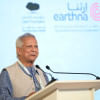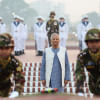Celebrating the legacy of Prof Yunus

In 1984, forty years ago, a then 44-year-old Muhammad Yunus was elected to receive the Ramon Magsaysay Award for Community Leadership for "his pioneering efforts in enabling rural men and women to become economically self-sufficient through sound group-managed credit. His work challenged misconceptions about the capabilities of the poor to save, collaborate, and effectively utilise loans."
Since its inception, the Grameen Bank has achieved remarkable success. Grameen Bank has grown to provide collateral-free loans to 7.5 million clients, 97 percent of whom are women, in more than 82,000 villages in Bangladesh.
Yunus's model has demonstrated that even the poorest individuals can enhance their lives with dignity and contribute to their country's economic growth.
Muhammad Yunus is globally recognised as "The Father of Microfinance."
In the Philippines, the Center for Agriculture and Rural Development-Mutually Reinforcing Institutions (CARD-MRI) was established in 1986. To date, CARD-MRI has empowered millions of Filipinos. Nine million of them accessed microloans, 30 million are insured through microinsurance, and five million individuals have access to its health programmes. We are honoured to have Dr Aris Alip, the founder of CARD-MRI, in the audience with us today.
In 1994, in Indonesia, Dompet Dhuafa, a humanitarian institution, empowered millions of Indonesians through the principle and power of Zakat, a religious offering that is one of the pillars of Islam. Dompet Dhuafa's microloans have benefited 24 million people—more than the entire population of Sri Lanka.
In Pakistan, Muhammad Amjad Saqib founded Akhuwat in 2001. His pioneering interest-free microfinance model is based on Islamic values and compassion, known as Mawakhat. Akhuwat has since grown into the world's largest interest-free microfinance organisation. To date, it has disbursed over $789 million in loans and lifted the lives of over 5.4 million people in Pakistan.
These are the movements inspired directly by the work of Muhammad Yunus and, as such, they too followed his footsteps.
In 2008, CARD-MRI received the Ramon Magsaysay Award.
In 2016, Dompet Dhuafa received the Magsaysay Prize.
In 2021, Muhammad Amjad Saqib also became a Magsaysay Laureate.
To date, there are countless other microfinance institutions globally that have followed Muhammad Yunus's model.
This is the collective impact that Professor Yunus started that merited him the Magsaysay Award. He has transformed the lives not only of millions of Bangladeshis but also billions of people around the world.
This is what the Ramon Magsaysay Award stands for—celebrating transformative, courageous leadership, selfless service, and the Greatness of Spirit of ordinary individuals and organisations that bring meaningful, lasting change.
Named after the seventh president of the Philippines, the Ramon Magsaysay Award honours individuals and organisations embodying commitment to the common man, reflecting President Magsaysay's life and leadership. To date, 348 women, men and organisations working across Asia have been conferred with what is now widely regarded as Asia's premier prize and highest honour. We have captured their inspiring stories in our 65th anniversary commemorative book series, simply called GREATNESS OF SPIRIT: Stories of Love, Courage and Service.
Forty years since Muhammad Yunus received the Ramon Magsaysay Award, a precursor to many of his other international accolades including the 2006 Nobel Peace Prize, we continue to celebrate the undeniable impact of his work—billions of lives changed through the power of microfinance.
As a token of our appreciation and to commemorate the 40th anniversary of Muhammad Yunus receiving the Ramon Magsaysay Award, the Foundation would like to present Muhammad Yunus, 1984 Ramon Magsaysay Awardee for Community Leadership, with his portrait. This portrait was specially commissioned for our 65th anniversary commemorative book series. This also serves as our birthday gift for his 84th birthday on June 28.

 For all latest news, follow The Daily Star's Google News channel.
For all latest news, follow The Daily Star's Google News channel. 








Comments